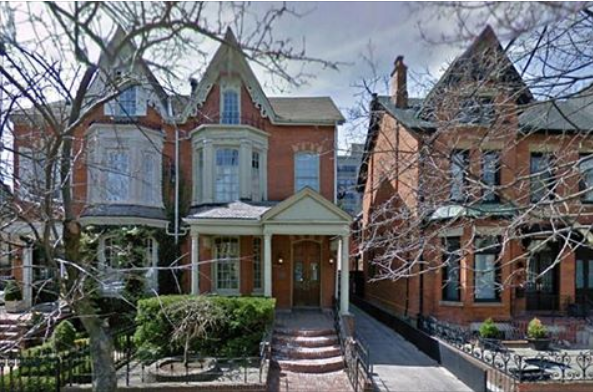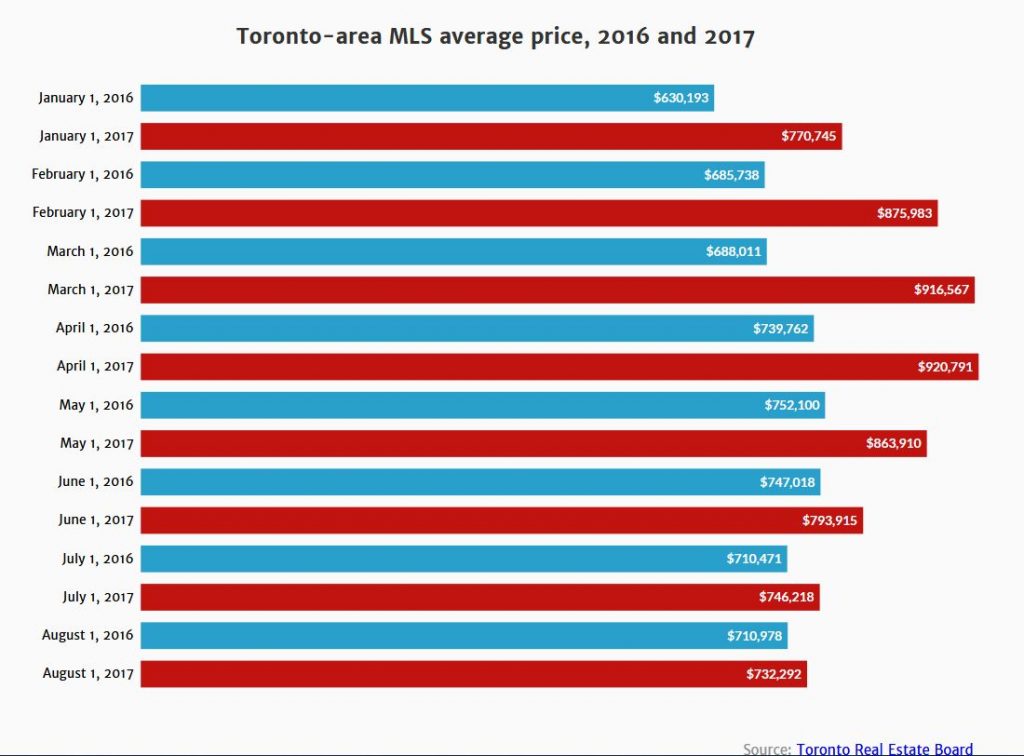The Toronto Real Estate Board( TREB) reported that the average cost of a home in August — $732,292 (including all house types and condos) — was still up 3 per cent or about $20,000 compared to August 2016.
But that is still down about 20 per cent or $187,000 lower than April, 2017, when the average rate peaked at $919,086.
The number of housing sales in August, 2017 also fell, 34.8 per cent year over year.
Mr. Doug Porter, chief economist at BMO Financial Group, who was among the first to use the word “bubble” to describe Toronto’s soaring house prices in March, 2017, says the numbers are actually good news for buyers who expect to live in their dwellings for years.
“There are indications in these numbers — even when they seem weak on the surface — that things are starting to stabilize,” he said.
“Solid economic underpinnings,” which inspired the Bank of Canada to hike interest rates a one-quarter percentage, will eventually shine through in the housing market, said Porter.
The increase in the overnight lending rate to 1 per cent, the second largest rise the summer months, will affect some of the very short-term mortgage rates but won’t make a big difference to the housing market immediately, he said.
Rates will slowly but surely climb, said the economist.
Meantime, the market is finding its equilibrium, said Porter, in accordance with the “sudden shock” in April, 2017 of the Ontario government’s Fair Housing Plan, which included a foreign buyer’s tax among a series of market chilling measures.
A 6.7 per cent year-over-year drop in new listings — the lowest level for August since 2010 — could, nonetheless, lead to accelerated price growth, said Jason Mercer, TREB director of market analysis.
“As we start to see an uptick in sales, or at least a slower rate of diminish, and new listings remain down on a year-over-year basis, we could actually start to see a tighten in the market ,” he said.
“The dip in demand has kind of disguised the fact that we still do have a supply trouble in the Greater Toronto Area ,” said Mercer.
While the price of detached houses in the region remained virtually unchanged this August, 2017 compared to last, the average condo price increased about 20 per cent.
TREB consumer polling shows a shift in the type of residences people said they’re intended to buy, toward denser housing sorts such as town the house and condos, and away from pricier disconnected mansions, he said.
The real estate market has the benefit of a strong economic foundation with strong GDP growth, low-grade interest rates and lower unemployment.
But the Toronto region remains a series of smaller markets that are coming back into equilibrium at differing rates, said Mr. Forbes, realtor.
In King, where the average price of a residence is about $1.5 million, he said, “it’s truly a buyer’s market.”
“There’s one home selling for every eight listings in that area. But in the City of Toronto, you’ve got a one (1) for two (2) — so every sale there’s just two listings on the market. That’s a seller’s marfket,” he said.
Durham, Peel and Halton parts are still seller’s markets, said Forbes.
Seeing prices close to what they were a year ago is reinstating customer confidence. At the same hour, he said, “Properties, if they’re priced properly are selling in two to three weeks — that is 20 to 25 day time.”
Meantime, there seems to be a return to a traditional seasonal market, said Mr. Zigelstein, realtor.
“Traditionally, summer is a slower day and I think we saw that this year. It’s very normal to go back to that seasonal marketplace that we haven’t seen in a few years because the market has been so hot for so long,” he said. “This just takes you back to an almost normal market precondition.”
Home prices reduced less than 2 per cent in August, 2017 from July, 2017, said Zigelstein.
“In a summer season where they’ve increased rates that’s a very good amount to be at,” he said. “It means everything is not dropping as much as everybody thinks it is.”
Premier Kathleen Wynne has said her Liberal government will continue to monitor the effects of the housing regulations.
“We’ll be working with the real estate committees both in Toronto and beyond to make sure that we’ve got it right. But, there was a real warning about the over-heated market and we’ve taken a 16 -point scheme and we’ll be monitoring the impact,” she said.
If you are planning to sell your home or Condo Apartment in downtown Toronto or in Central Toronto areas, please call, text of email Max Seal, Broker at 647-294-1177. Please visit http://www.TorontoHomesMax.com for a FREE Home Evaluation“.
If you are planning to buy a home or a Condo Apartment in the Central Toronto areas, please call, text of email Max Seal, Broker at 647-294-1177. Please visit my website http://www.centraltorontorealestate.com/ to find out available homes and Condos for sale in Downtown Toronto and Central Toronto areas.



Leave a Reply